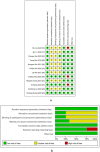Transcutaneous Electrical Acupoint Stimulation for Preventing Postoperative Delirium: A Meta-Analysis
- PMID: 37089912
- PMCID: PMC10115199
- DOI: 10.2147/NDT.S404805
Transcutaneous Electrical Acupoint Stimulation for Preventing Postoperative Delirium: A Meta-Analysis
Abstract
Objective: This meta-analysis of randomized controlled trials (RCTs) aims to evaluate the efficacy and safety of transcutaneous electrical acupoint stimulation (TEAS) for postoperative delirium (POD) in surgical patients.
Methods: Based on database searches of the Wanfang, China National Knowledge Infrastructure (CNKI), VIP, Chinese Biology Medicine (CBM), PubMed, Cochrane Library, and Web of Science, relevant RCTs published before December 30, 2022, were extracted. Outcome indicators included the incidence of POD, changes in Confusion Assessment Method (CAM) scores, Visual Analogue Scale (VAS) scores, and the intraoperative consumption of anesthetics. Data were pooled and analyzed by Review Manager 5.3, and publication bias detection was conducted using Stata 17.0.
Results: A meta-analysis containing 715 experimental and 717 control participants from 12 RCTs was performed. The overall results showed that TEAS had obvious superiority with a lower incidence of POD on any day during the postoperative 1 week. In subgroup analyses, the CAM scores on the third postoperative day were significantly lower in the TEAS group than in the control group (MD = -0.52, 95% CI: -1.02 to -0.03, P = 0.04), the VAS scores on the first postoperative day were significantly lower in the TEAS group than in the control group (MD = -0.19, 95% CI: -0.36 to -0.02, P = 0.03), the consumption of propofol and remifentanil were both significantly lower in the TEAS group compared with the control group (MD = -23.1, 95% CI: -37.27 to -8.94, P = 0.001; MD = -105.69, 95% CI: -174.20 to -37.19, P = 0.002). No serious adverse events of TEAS were reported in any of the referenced studies.
Conclusion: TEAS has an obvious curative effect in preventing POD and pain in the earlier stage of surgical patients. It could be a promising assisted anesthesia technique in the future.
Keywords: POD; TEAS; meta-analysis; postoperative delirium; transcutaneous electrical acupoint stimulation.
© 2023 Guo et al.
Conflict of interest statement
The authors declare that they have no competing interests.
Figures









Similar articles
-
Combining various acupuncture therapies with multimodal analgesia to enhance postoperative pain management following total knee arthroplasty: a network meta-analysis of randomized controlled trials.Front Neurol. 2024 Mar 18;15:1361037. doi: 10.3389/fneur.2024.1361037. eCollection 2024. Front Neurol. 2024. PMID: 38562427 Free PMC article.
-
Transcutaneous electrical acupoint stimulation for the prevention of perioperative neurocognitive disorders in geriatric patients: A systematic review and meta-analysis of randomized controlled trials.Medicine (Baltimore). 2022 Dec 16;101(50):e32329. doi: 10.1097/MD.0000000000032329. Medicine (Baltimore). 2022. PMID: 36550918 Free PMC article.
-
Transcutaneous Electrical Acupoint Stimulation for the Prevention of Postoperative Cognitive Dysfunction: A Systematic Review and Meta-Analysis.Front Med (Lausanne). 2021 Dec 6;8:756366. doi: 10.3389/fmed.2021.756366. eCollection 2021. Front Med (Lausanne). 2021. PMID: 34938745 Free PMC article.
-
Systematic review and meta-analysis of the effect of transcutaneous electrical acupoint stimulation on gastrointestinal function after laparoscopic surgery.Ann Palliat Med. 2021 Nov;10(11):11840-11848. doi: 10.21037/apm-21-3046. Ann Palliat Med. 2021. PMID: 34872308
-
The efficacy and safety of transcutaneous electrical acupoint stimulation (TEAS) for postoperative pain in laparoscopy: A protocol for systematic review and meta-analysis of randomized controlled trials.Medicine (Baltimore). 2021 Jun 25;100(25):e26348. doi: 10.1097/MD.0000000000026348. Medicine (Baltimore). 2021. PMID: 34160400 Free PMC article.
Cited by
-
Effect of Different Frequencies of Transcutaneous Electrical Acupoint Stimulation (TEAS) on EEG Source Localization in Healthy Volunteers: A Semi-Randomized, Placebo-Controlled, Crossover Study.Brain Sci. 2025 Mar 3;15(3):270. doi: 10.3390/brainsci15030270. Brain Sci. 2025. PMID: 40149791 Free PMC article.
-
Effects of Patient-Controlled Transcutaneous Electrical Acupoint Stimulation on Cancer Induced Bone Pain Relief in Patients with Non-Small Cell Lung Cancer: Study Protocol for a Randomized Controlled Trial.J Pain Res. 2024 Mar 26;17:1285-1298. doi: 10.2147/JPR.S437296. eCollection 2024. J Pain Res. 2024. PMID: 38560406 Free PMC article.
-
Comparison of the effects of remimazolam and propofol on postoperative delirium in elderly surgical patients: a meta-analysis.BMC Anesthesiol. 2025 Jul 1;25(1):329. doi: 10.1186/s12871-025-03197-6. BMC Anesthesiol. 2025. PMID: 40597650 Free PMC article.
-
Transcutaneous electrical acupoint stimulation reduces postoperative patients' length of stay and hospitalization costs: a systematic review and meta-analysis.Int J Surg. 2024 Aug 1;110(8):5124-5135. doi: 10.1097/JS9.0000000000001598. Int J Surg. 2024. PMID: 38775581 Free PMC article.
References
Publication types
LinkOut - more resources
Full Text Sources

